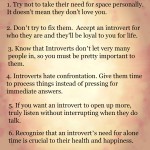
An estimated 26% of Americans aged 18 and older (about one in four adults) suffer from a diagnosable mental disorder in a given year, according to Johns Hopkins Medicine. While some may assume that introverts experience mental health issues, it’s important to realize that this isn’t necessarily the case. From the difference between introversion and mental health conditions like anxiety to the research behind the matter, here’s what you should know — and how you can effectively stay on top of your mental health, too.
Introversion and mental health — a brief overview
While there may be some links between mental health and introversion, it’s important to note that introversion itself is not a mental health condition. “Many introverts prefer minimally stimulating environments — they often like doing solo activities or spending time in familiar spaces or with people they know well,” explains Mental Health America.
“Being in busier or more active social environments isn’t necessarily anxiety-inducing for them — they just know it will take a lot more energy to be “on.”” In addition to understanding the difference between introversion and mental health conditions, it’s necessary to realize that someone who identifies as an introvert can also experience mental health issues at the same time.
Healthline highlights that while research suggests that social anxiety may be somewhat more common in introverted people, there’s still a lot of variability in individual personality traits. It’s also noted that you can have social anxiety if you lie more toward the extroverted end of the spectrum.
While introverts are known for positive attributes — such as being good listeners or being observant, one post from The List notes that being introverted can lead to excessive isolation, which can “make someone more susceptible to depression and other mental health issues, according to New York therapy practice Family Addiction Specialist.” The article further highlights how overthinking can ‘act as a gateway’ to anxiety disorder (or general social anxiety), as per Med Daily.
Prioritizing mental wellness
For those who identify as an introvert, it’s important to stay on top of your mental health whether you experience a mental health condition or not. Getting into a self-care routine can be particularly beneficial. This includes prioritizing things like eating regular, healthy meals, getting enough sleep, and making time for the things you love to do. Making time for healthy relationships with friends and family can help, too, especially when preventing isolation.
Reaching out to a mental health professional and starting therapy is another great way to stay on top of your mental health as an introvert, especially if you’re unsure whether or not you have a mental health condition like anxiety. Getting help from a professional is also essential if you begin experiencing feelings of depression, or if you find yourself experiencing feelings of isolation or loneliness.
Another option to get the support you need is to go on a mental health retreat with medical support. These kind of retreats offer holistic help and encouragement in a relaxing environment. It’s a wonderful opportunity to get away and restore your mental health.
However, it’s important to note that getting support can be beneficial even if you feel okay. “Seeking therapy is a routine and preventive form of healthcare, like going to the dentist or the doctor,” says Joyce Marter, a licensed psychotherapist and founder of Urban Balance. Later on in the Healthline article, Marter says: “You will feel better after you connect with a therapist. It’s a wonderful, caring, and compassionate thing to do for yourself.”
According to Verywell Health, the potential benefits of mental health therapy include better communication skills, increased happiness and life satisfaction, and the development of skills for coping with daily life challenges and stress — to highlight just a few. For introverts looking to begin their mental health journey, finding the right therapist can seem difficult, especially when considering that it may take a few tries before finding the right one.
By using resources — such as those that allow you to search for therapists in your area, you can easily get in touch with someone. For introverts who also happen to experience a mental health issue such as anxiety, using online resources like search engines can help in finding a mental health professional who specializes in said condition.
Introverts are well known to enjoy their time alone (among other traits), though it’s necessary to keep in mind that introversion itself is not a mental health condition. That said, staying on top of mental health is important for everyone. For introverts, taking care of your mental health can be a great way to stay on top of things while preventing issues that could lead to further problems (such as excessive isolation).










